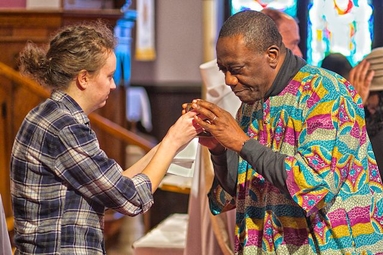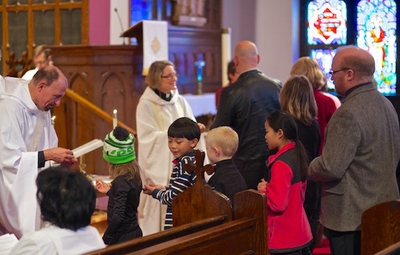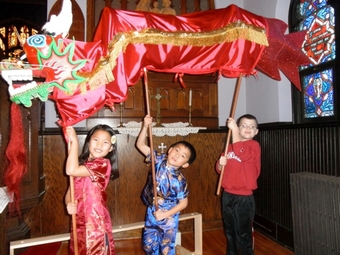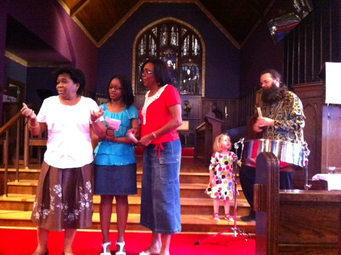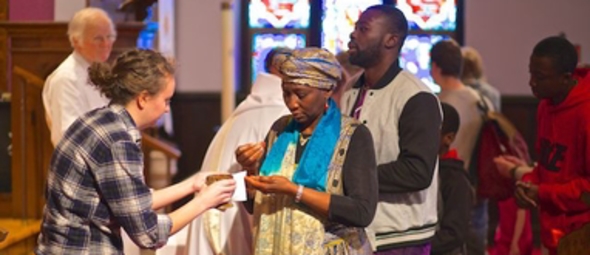
The Future God is Bringing Forth at St. Matthew’s: Global Anglican Worship
Rev. Blair Pogue
Beginning in January 2008, St. Matthew’s began to incorporate liturgical resources, music, and the languages of members of the St. Matthew’s community from the majority world into its worship. This experience was so life-giving that we’ve continued to feature a country at least one of our parishioners is from each Epiphany (this liturgical season emphasizing Christ’s revelation and manifestation to the world begins on January 6). On its website St. Matthew’s describes itself as “a neighborhood church with a worldwide community.” It is important to me and to many of the people of St. Matthew’s that our worship represent the global diversity in our midst. Presently, the congregation includes members from nine nonwestern nations.
Recently I conducted focus groups with members of St. Matthew’s representing the church’s rich cultural and theological diversity. Participants in all of the focus groups mentioned how much the global liturgies and music St. Matthew’s uses mean to them. Many individuals stated that when they were looking for a church they were drawn to St. Matthew’s because of its commitment to using Anglican liturgies and global Christian music.
The music used for these liturgies is usually indigenous to the countries and cultures being featured (and hot off the press in the case of the Jamaican music). In a couple of cases music has been sung by parishioners and transcribed (Kenya, Zimbabwe), or written from scratch (China). In the case of the China liturgy, St. Matthew’s Music Director Michael Compton did research on traditional Chinese music and instruments and then wrote a Gloria, Psalm tone, Gospel Acclamation, Sanctus, and Agnus Dei, specifically for the services. They incorporated the er’hu, pipa, and gong.
Using indigenous music has been incredibly life-giving to our congregation. It has helped to make our communal worship more joyful and celebratory. When asked what in St. Matthew’s worship is most meaningful, one focus group participant responded, “absolutely the global music. Not to mention that when I hear the Jamaican rhythm. It's really, really, really life-giving.”
Countries featured thus far include Kenya, Zimbabwe, Jamaica, China, Uganda and Nigeria. The liturgy is accompanied by an all-ages education forum taught by a church member or church members from the featured country, food, and an art show (since 2009). These liturgies have helped St. Matthew’s develop a more expansive liturgical and musical repertoire authentic to our congregation. It has also increased our awareness of the different cultures and traditions in our midst.
Additionally, the global liturgies have helped the people of St. Matthew’s connect with people outside our church from the featured countries. For example, when the church featured Zimbabwe, Zimbabweans living in the metropolitan area in which St. Luke’s is located, people interested in Zimbabwe, and friends of church members joined the community for the all-ages forum, worship service, and reception featuring native foods. Some of them read or sang in Shona in the service, another helped with a power point about Zimbabwe, and still others made food for the reception.
The same was true of the China liturgy, and the Uganda liturgy we launched last year. After the Uganda liturgy everyone who came to the service was treated to a delicious lunch hosted by members of our congregation – but also by Ugandan guests and neighbors who live in the Cities. It was a great opportunity to get to know some of our Ugandan neighbors, and to learn more about their country of origin.
When I conducted focus groups with members of our congregation, one of the world Anglicans interviewed said that the global music and liturgies helped St. Matthew’s look more like God’s Kingdom. For this person, global music and prayers from different parts of the world meant greater authenticity and respect for church members from non-western cultures. As she observed, “. . . we have come a long way. You know, again the music around the world, respecting the people who are here. That's what God's kingdom will look like . . .”


